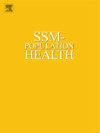Impact of hearing aid use on depression and quality of life in older patients with age-related hearing loss: A focus on social relationships
IF 3.1
2区 医学
Q1 PUBLIC, ENVIRONMENTAL & OCCUPATIONAL HEALTH
引用次数: 0
Abstract
Hearing loss is a sensory deficit prevalent in older adults. In South Korea, over 40 % of individuals aged 60 and older reportedly experience unilateral or bilateral hearing loss. An association between perceived social support and satisfaction with hearing aid use has been reported. Although most previous studies focused on the direct effects of hearing aid use, its impact on social relationships remains poorly explored. We analyzed data from the Korean Longitudinal Study of Aging between 2006 and 2022 for those aged 65 years or above. Outcome measures in this study were depressive symptoms and self-reported quality of life (QoL) scores. The independent variable in this study was hearing aid use. A regression analysis was performed using a generalized estimating equation (GEE) model. Additionally, the interaction effect between hearing aids and social relationships was examined by performing an interaction term analysis. Of the 554 participants, 177 (31.9 %) used hearing aids. GEE analysis revealed that participants who used hearing aids had a lower depressive symptoms score (β = −0.328, 95 % confidence interval (CI) = −0.625 to −0.031) and higher self-reported QoL (β = 2.193, 95 % CI = 0.060 to 4.327). The interaction term analysis demonstrated a significant interaction effect between hearing aid use and social relationships. Hearing aid use was associated with reduced depressive symptoms and enhanced QoL in older adults with hearing loss. These effects were further moderated by the strength of social relationships, underscoring the importance of both auditory and social interventions in promoting mental and emotional well-being in aging societies.
助听器使用对老年听力损失患者抑郁和生活质量的影响:社会关系的焦点
听力损失是老年人普遍存在的一种感觉缺陷。在韩国,据报道,超过40%的60岁及以上的人患有单侧或双侧听力损失。感知到的社会支持与助听器使用满意度之间存在关联。虽然大多数先前的研究都集中在助听器使用的直接影响上,但它对社会关系的影响仍未得到充分探讨。我们分析了2006年至2022年韩国老龄化纵向研究中65岁以上老人的数据。本研究的结果测量是抑郁症状和自我报告的生活质量(QoL)评分。本研究的自变量是助听器的使用。采用广义估计方程(GEE)模型进行回归分析。此外,助听器与社会关系之间的互动效应通过互动项分析进行检验。在554名参与者中,177人(31.9%)使用助听器。GEE分析显示,使用助听器的参与者抑郁症状评分较低(β = - 0.328, 95%可信区间(CI) = - 0.625至- 0.031),自我报告的生活质量较高(β = 2.193, 95% CI = 0.060至4.327)。交互项分析显示助听器使用与社会关系之间存在显著的交互效应。助听器的使用与老年听力损失患者抑郁症状的减轻和生活质量的提高有关。社会关系的强度进一步缓和了这些影响,强调了听觉和社会干预在促进老龄化社会心理和情感健康方面的重要性。
本文章由计算机程序翻译,如有差异,请以英文原文为准。
求助全文
约1分钟内获得全文
求助全文
来源期刊

Ssm-Population Health
PUBLIC, ENVIRONMENTAL & OCCUPATIONAL HEALTH-
CiteScore
6.50
自引率
2.10%
发文量
298
审稿时长
101 days
期刊介绍:
SSM - Population Health. The new online only, open access, peer reviewed journal in all areas relating Social Science research to population health. SSM - Population Health shares the same Editors-in Chief and general approach to manuscripts as its sister journal, Social Science & Medicine. The journal takes a broad approach to the field especially welcoming interdisciplinary papers from across the Social Sciences and allied areas. SSM - Population Health offers an alternative outlet for work which might not be considered, or is classed as ''out of scope'' elsewhere, and prioritizes fast peer review and publication to the benefit of authors and readers. The journal welcomes all types of paper from traditional primary research articles, replication studies, short communications, methodological studies, instrument validation, opinion pieces, literature reviews, etc. SSM - Population Health also offers the opportunity to publish special issues or sections to reflect current interest and research in topical or developing areas. The journal fully supports authors wanting to present their research in an innovative fashion though the use of multimedia formats.
 求助内容:
求助内容: 应助结果提醒方式:
应助结果提醒方式:


